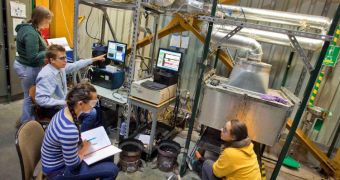Back in January 2010, the small Caribbean island of Haiti was struck mercilessly by an intense earthquake that killed as many as 230,000 people. One of its consequences was that even cooking became a perilous activity. Berkeley Lab experts now seek to develop cookstoves for these people.
The research team, based at the US Department of Energy's (DOE) Lawrence Berkeley National Laboratory (Berkeley Lab) can already boast the creation of the Berkeley-Darfur Stove, which has been in use in refugee camps in central Africa for years.
At this point, the same group of experts is evaluating inexpensive metal cookstoves, which they say could potentially be deployed at very low costs. Berkeley Lab scientists are working closely with colleagues from the University of California in Berkeley (UCB) on this endeavor.
The most important goal in this research is to identify the safest and most fuel-efficient stove. One way to go about doing this is to compare the traditional cooking devices used in Haiti with a large number of commercially-available alternatives.
Another way to complete this study is to design a new, high-efficiency cookstove from scratch. The manufacture of such instruments could then be funded by nonprofit organizations still present in Haiti to aid in the relief effort.
The manufacturing could be done in local metal shops in Haiti, therefore providing a boost to the country's nearly-inexistent economy. This combined approach to doing things could ensure that everyone has something to gain from this endeavor.
“A more efficient cookstove would not only save Haitian families and aid organizations money on fuel, but could also reduce pressure to cut down trees in this already heavily deforested island nation,” Haiti Stove Project leader Ashok Gadgil explains.
“More efficient stoves that emit less carbon monoxide and smoke could also help reduce the adverse impacts of these emissions on the health of the cooks in Haiti, who are mostly women,” he adds.
The expert holds an appointment as the director of the Berkeley Lab Environmental Energy Technologies Division, and was one of the critical members of the team that developed the Berkeley-Darfur stove.
As soon as the team manages to identify a functional alternative to currently-used stoves, experts will proceed towards implementing their long-term plan. This measure could at the very least improve the quality of life of people living in a devastated country.

 14 DAY TRIAL //
14 DAY TRIAL //